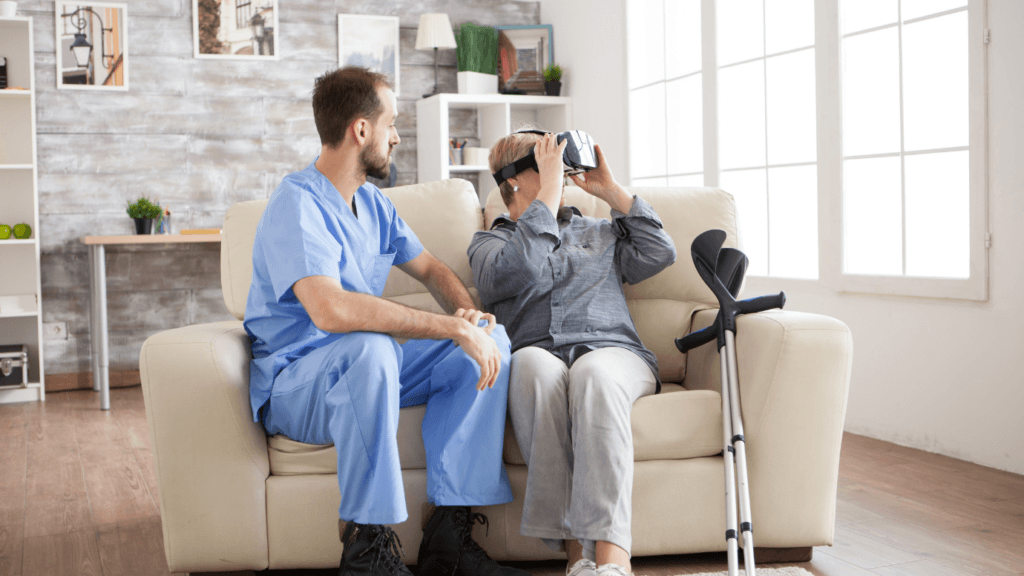Content Marketing in Healthcare: Strategies for Patient Education & Engagement

In today’s digital era, where information is at the fingertips of patients and healthcare consumers, the power dynamics in healthcare have witnessed a significant shift. Google receives more than 1 billion health-related questions every day. Patients are no longer passive recipients of care. Rather, they are active, informed participants in their health journey. The role of content marketing in facilitating this transition cannot be overstated.
Through strategically crafted content, healthcare providers and organizations can play an instrumental role in educating and engaging patients. In this article, we will explore the profound impact of content marketing on patient education, engagement, and overall healthcare experience.
Understanding the Paradigm Shift
The digital age has democratized information and effectively reshaped the patient-healthcare provider dynamic. Traditionally, patients played a more passive role, relying almost exclusively on physicians for medical insights. Today, however, they are equipped with a plethora of online resources, allowing them to actively participate in their healthcare decisions. This empowerment underscores the growing importance of accurate and accessible content.
As patients increasingly turn to the web for information, healthcare providers have a pivotal role: to be the trusted voice amid a cacophony of digital information. By understanding this shift, healthcare professionals can better tailor their content marketing strategies to meet the informed patient where they are. They can ensure they receive accurate, timely, and relevant information. This evolution not only enriches the patient experience but also solidifies the healthcare provider’s position as a central and credible figure in the patient’s health journey.
Content Marketing: Beyond Just Promotion
At its core, content marketing is an art of storytelling. It offers brands, including those in the healthcare sector, an opportunity to go beyond traditional advertising, delving deeper into narratives that resonate with their audience. While many outside the industry might misconstrue content marketing as just another avenue for promotion, its true essence is in value-driven communication.
For healthcare providers, this means venturing beyond mere product placements or service offerings. It’s about humanizing healthcare, offering stories of patient triumphs, insights into breakthrough treatments, or simply providing a clearer understanding of common medical conditions. By doing so, content marketing transforms from a tool aimed at increasing visibility to one centered on building trust and fostering long-term relationships.
Moreover, with the digital landscape offering numerous platforms, from blogs to videos to podcasts, healthcare providers can use diverse mediums to reach different segments of their audience. A well-researched blog post might appeal to someone researching a specific medical condition, while an engaging video could shed light on the patient experience at a healthcare facility.
The future of healthcare content marketing also promises further integration with technologies like artificial intelligence. Imagine personalized content journeys where content is delivered based on a patient’s unique medical history or queries. The possibilities are vast, emphasizing the notion that content marketing in healthcare is not just about promotion; it’s about establishing a dialogue, building trust, and ultimately, enhancing patient care.
Educating Patients: A Pillar of Preventative Care
Education is at the heart of preventative care. Patients are better equipped to make decisions that boost their health when empowered with the knowledge about their conditions, risk factors, and lifestyle choices. Well-crafted content can:
- Demystify Medical Jargon: Transform complex medical terms into digestible, easy-to-understand information.
- Provide Actionable Tips: Offer guidance on diet, exercise, mental well-being, and more.
- Shed Light on Conditions: Describe symptoms, treatment options, and prognosis in a balanced, empathetic manner.
Engaging Patients through Content Marketing: Fostering a Two-Way Relationship
Engagement goes beyond education. It’s about creating a dialogue. Effective content marketing fosters:
- Interactivity: This could be through quizzes, self-assessment tools, or chatbots that provide tailored advice.
- Community Building: Online forums or social media groups where patients can share experiences and offer support.
- Feedback Mechanisms: Encouraging reviews, surveys, and comments to refine the healthcare experience and content strategy. In fact, research shows that 72 percent of consumers read online ratings and reviews to consider booking with a new healthcare provider.

Personalizing the Patient Journey with Content Marketing
Personalization has emerged as a buzzword across industries, and healthcare is no exception. In an era marked by the demand for individualized experiences, content marketing stands out as a powerful tool to make these personalized patient journeys a reality.
To understand the magnitude of its impact, consider this: Two patients, both diagnosed with the same condition, might have vastly different queries, concerns, and emotional responses based on their backgrounds, age, lifestyle, and previous health experiences. Tailored content, driven by smart data analytics, can address these individual nuances, ensuring that each patient feels seen, heard, and understood.
For instance, a younger patient diagnosed with diabetes might be seeking content on how the condition could impact their active lifestyle, dietary habits, or even future family planning. In contrast, an older patient might have concerns about managing multiple medications, potential complications, or integrating care with other age-related health issues. Through content marketing, healthcare providers can craft specialized materials that resonate with these distinct demographics, thereby enhancing patient trust and adherence to treatment protocols.
The integration of AI and machine learning further accentuates the potential for personalization. With these technologies, it’s possible to predict the type of content a patient might seek next, based on their browsing behavior, or even proactively address common concerns that arise at specific points in a patient’s treatment journey.
A Beacon of Hope
Personalized content isn’t restricted to addressing medical concerns. It can also be a beacon of hope. Patient testimonials, success stories, or even insights into new research can be tailored to align with the interests and concerns of specific patient segments. By doing so, content not only informs but also empowers and uplifts.
In essence, as the healthcare landscape continues to evolve, personalizing the patient journey through content marketing is no longer just a competitive advantage. It’s fast becoming a necessity. Providers that recognize and act on this are poised to redefine patient care, making it a collaborative, transparent, and deeply individualized experience.
The Ethical Considerations in Healthcare Content Marketing
In a sector as sensitive and vital as healthcare, content marketing carries with it a weighty responsibility. While the overarching goal is to educate, engage, and empower, the ethical considerations underlying each piece of content are paramount. Let’s delve deeper into these ethical nuances:
Accuracy and Credibility
Misinformation, especially in healthcare, can have dire consequences. Every piece of content, whether it’s a blog post about a specific condition or a video on post-operative care, must be rigorously fact-checked and sourced from reputable medical literature or experts. Furthermore, periodic content updates are crucial to ensure that the information remains current in light of new research findings.
Transparency
With the rise of sponsored content and affiliations in the digital realm, being upfront about any potential biases or partnerships is essential. If content is sponsored by a pharmaceutical company or features a product, it’s essential to disclose such relationships. Being transparent in this manner is ethical and helps maintain trust with the audience.
Patient Privacy
Sharing patient stories or testimonials is a powerful tool in humanizing healthcare experiences. However, ensuring that patient information is anonymized or shared with explicit consent is of utmost importance to maintain confidentiality and adhere to regulations like HIPAA.
Empathy and Sensitivity
Health concerns are deeply personal and often charged with emotion. Content must be crafted with a profound sense of empathy. This includes avoiding fear-mongering, being conscious of diverse cultural perspectives, and being sensitive to potential triggers. For instance, when discussing weight management, creators should frame the content positively and avoid language that could perpetuate body-shaming.
Accessibility
Ethical content marketing ensures that information is accessible to everyone. This includes those with different physical abilities and language proficiencies. Content creators could provide content in multiple languages, ensure websites work with screen readers for the visually impaired, and offer video content with captions for the hearing impaired.
Engagement Ethics
Engagement tactics, like CTAs (Call to Actions), are standard in content marketing. In healthcare, professionals must use these CTAs judiciously. For example, encouraging users to share their personal health stories is fine, but using alarmist tactics to spur appointments or medication refills might cross ethical boundaries.
When healthcare providers ground their content marketing efforts in these ethical considerations, they not only strengthen trust with their patients but also underscore their commitment to holistic well-being, valuing mental, emotional, and social health as much as physical health.
Measuring the Impact: Content Marketing Metrics in Healthcare
To assess the effectiveness of content marketing efforts, healthcare organizations must track relevant metrics, such as:
- Engagement Metrics: Page views, time spent on pages, and social media shares.
- Feedback: Comments, reviews, and direct feedback.
- Conversion: For actionable items, like appointment bookings or downloads of a health app.

Future-forward: The Integration of Augmented Reality and Virtual Reality in Healthcare Content Marketing
The healthcare industry is at the forefront of integrating cutting-edge technologies to enhance both patient care and patient education. Augmented Reality (AR) and Virtual Reality (VR) are two such technological advancements that are paving the way for revolutionary changes in content marketing within the healthcare sector. Here’s a deep dive into their potential applications and benefits:
Enhanced Patient Education
Imagine a patient virtually exploring the human body in 3D. They could understand how a drug affects cells or visualize the progression of a disease. VR offers immersive experiences, making complex medical concepts tangible and accessible to patients, thereby promoting a deeper understanding.
Pre-operative Preparations and Simulations
Surgeons and medical professionals can leverage VR to walk patients through their upcoming procedures. This allows them to understand, visualize, and mentally prepare for what’s ahead. Such immersive preparation can ease anxiety and set clearer expectations.
Interactive Treatment Plans
AR applications can potentially transform how patients follow treatment plans. For instance, pointing a mobile device at a medication bottle could instantly display dosage instructions, side effects, and even interactive tutorials on how to administer the drug.
Training and Professional Development
Beyond patient education, AR and VR can serve as invaluable tools for medical training. Medical students can virtually ‘participate’ in surgeries, explore detailed 3D models of the human body, or simulate emergency medical scenarios – all in a controlled, risk-free environment.
Personalized Patient Experience
As AR and VR technologies become more integrated with AI, there’s potential for personalized patient content experiences. Based on a patient’s medical history, preferences, and concerns, customized VR journeys can be crafted. These journeys can range from therapeutic relaxation experiences to detailed insights into specific conditions.
Rehabilitation and Therapy
VR is also making strides in the realm of patient therapy and rehabilitation. Customized virtual environments can assist in physical therapy, pain management, and even cognitive rehabilitation, making the therapeutic process more engaging and measurable.
Enhancing Remote Consultations
With the rise of telemedicine, AR and VR can further bridge the gap between patients and healthcare providers. These technologies can facilitate virtual clinic tours and 3D visualizations of patient diagnostics. They can even allow patients to ‘step into’ a virtual doctor’s office for consultations.
In the ever-evolving landscape of healthcare, AR and VR are more than just futuristic concepts. They are present-day tools that drive meaningful engagement, deepen understanding, and improve patient outcomes. Healthcare content marketing is embracing these technologies. This shift heralds an era marked by immersive, interactive, and personalized patient experiences.
A Unique Opportunity
The role of content marketing in shaping the patient experience in today’s healthcare landscape is profound. As patients increasingly seek information and support online, healthcare providers and organizations have a unique opportunity. Through strategic content marketing, they can not only educate but deeply engage their audience, fostering trust, understanding, and a collaborative approach to healthcare. The future of healthcare is patient-centric, and content marketing is a powerful tool in making that vision a reality.
emagineHealth is the digital-first, AI-powered agency for healthcare and life sciences. Let’s work together to maximize the results of your digital marketing initiatives.

Paid Digital Media for Healthcare & Biopharma
In our newest ebook, Paid Digital Media for Healthcare & Biopharma, we discuss how to get in front of your ideal audience, the importance of targeting the patient and HCP journey, how to determine which platforms to focus on, and more.